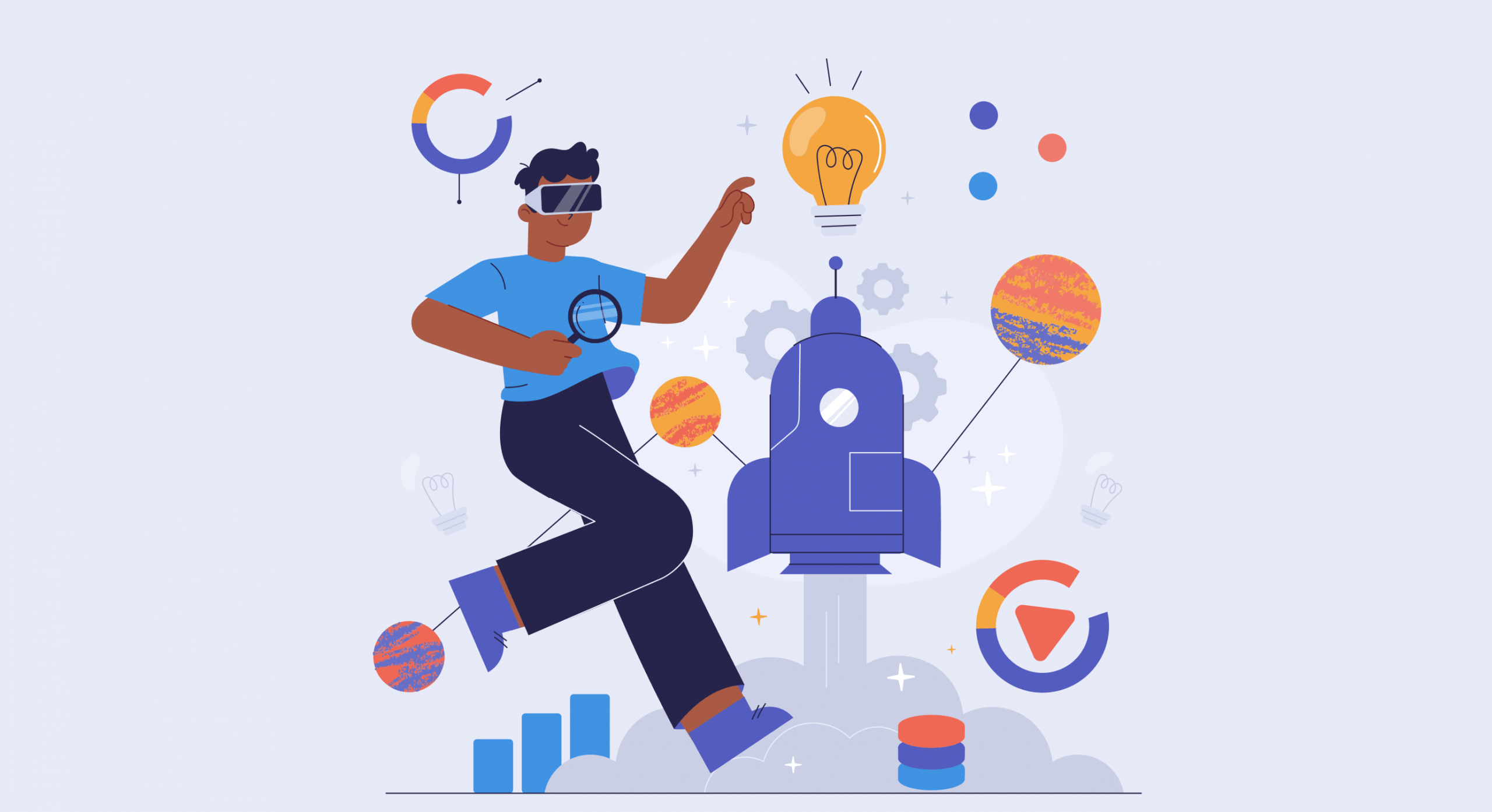It’s the 21st century, where science fiction is turning into reality; the age of Artificial Intelligence (AI). We’re at the quarter mark, and the technology, still in its nascence, is already a major part of daily lives. And AI’s inherent ability to make lives easier is precisely what makes it such an integral part of a brand/product’s user experience (UX).
From intuitive, and seemingly empathetic chatbots for various services, to observing and personalising recommendations for online shoppers, to helping us drive better, AI is no longer a novelty; it has become a foundational component of modern product design, and this is just the beginning. The transformation is changing in real-time, and experiences are not just responsive but predictive, not just personalised but truly individualised.
The future of AI in UX is optimistic and tremendously opportunistic. But harnessing the true capabilities of this complex technology and deploying them in a manner aligned with set goals requires expertise, and that’s where professional AI consulting services are extremely relevant.
It is their task to provide a coherent understanding of key AI-driven customer experience trends that are essential for any business aiming to innovate and lead in the years to come. Here are three such trends that should be considered:
Trend 1: The Shift to Proactive and Predictive Experiences
The evolution is shifting from AI that reacts to user commands to one that anticipates their needs. Proactive AI systems will anticipate a user’s needs and offer the best possible assistance preemptively. This goes beyond basic recommendations; it creates a holistically assistive digital environment around a user’s needs in a precise situation and potentially what they would need for an enhanced experience.
Imagine booking a flight via a travel app – the flights are booked when the app cross-references weather data and suggests an apt packing list; after which it offers a range of local transport options, and even offers to make reservations at restaurants that have the user’s favourite food.
This shift from a reactive to a predictive model has seen a tremendous rise in the impact of AI on user engagement. When a product or service demonstrates a deeper understanding of a user’s context and proactively tries to simplify their life, it enhances their sense of trust and value. This significantly reduces their effort and cognitive load, leading to higher satisfaction and loyalty. Research from firms like McKinsey has consistently shown that when brands leverage data analytics properly, boosting proactive customer engagement becomes easier. This, in turn, leads to substantial improvements in customer lifetime value and retention. Their report discusses the value of proactive, consistent journeys, which AI is uniquely positioned to handle.

Trend 2: Hyper-Personalisation at Scale
When we discuss product or service personalisation today, it is largely based on segmentation and a user’s past behaviour. Modern technology has taken things a little further – the future of AI in UX points towards hyper-personalisation, where the experience is dynamically tailored to a single user in real-time.
Let’s dig a little deeper into hyper-personalisation and what it involves:
- Dynamically Adapting Interfaces: The user interface (UI) could change based on the user’s proficiency, current goal, or even inferred emotional state. A novice user might see a simpler interface with more guidance, while an expert would have a power-user layout with advanced shortcuts.
- Individually Generated Content: AI will generate content—from marketing copy and product descriptions to entire learning modules—that is uniquely crafted for an individual’s context, knowledge level, and preferred tone.
- Contextual Journey Orchestration: The entire user journey can be individualised. AI will guide users through the most efficient path for them, dynamically adjusting steps and information based on their real-time behaviour and needs.
This level of customisation creates an experience where the user feels completely understood. The business benefits are immense; for instance, a 2025 report by Twilio highlighted that today, customers don’t just expect personalisation, they demand individualisation, the presence of which directly translates to increased customer loyalty and higher spending. This makes mastering hyper-personalisation a central theme among emerging AI-driven customer experience trends.
Trend 3: The Rise of Multimodal and Immersive Interfaces
Interaction with technology has surpassed touchscreen and keyboards – voice commands, gestures, eye movements, and even neural inputs have become viable interaction methods.
Naturally, AI had to keep pace with these “multimodal interfaces” (systems that process multiple types of human input), and so, systems have been “adapted” to accept input, regardless, and produce appropriate outputs.
For example, instead of a user having to switch modes consciously (e.g., to stop typing to issue a voice command), future AI models will seamlessly fuse these inputs. A user might point at an object on a screen while asking a question about it, and the AI will understand the combined context. This is a cornerstone of the future of AI in UX.
Furthermore, AI is critical for creating truly immersive experiences in Augmented Reality (AR) and Virtual Reality (VR). It allows virtual environments to be responsive and intelligent, with non-player characters (NPCs) that are genuinely conversational and virtual objects that react realistically to interaction. As these technologies mature, so will the impact of AI on user engagement within them, moving from novelty to deep, meaningful interaction. Market research consistently points to strong growth in the AR/VR market, an expansion heavily reliant on AI advancements.

The Strategic Imperative: Navigating the Future with Expertise
While these future trends are exciting, they present significant strategic and technical challenges for businesses. Successfully navigating this evolution requires more than just adopting new technology; it demands a clear, forward-thinking strategy.
Key challenges include:
- Ethical AI Implementation: Ensuring fairness, transparency, and data privacy in complex AI systems to build and maintain trust.
- Technical Complexity: Integrating predictive models, real-time data streams, and multimodal interfaces requires specialised skills and robust data infrastructure.
- Strategic Alignment: Ensuring that AI initiatives are not just science experiments but are tightly aligned with core business objectives and deliver measurable value.
This is precisely where the role of expert AI consulting services becomes critical. Partnering with specialists provides a clear advantage as they help organisations to:
- Develop a Strategic Roadmap: They can assess a company’s readiness and craft a tailored roadmap for AI adoption that aligns with its specific goals, market, and customer base.
- Navigate Technology Selection: Consultants provide objective guidance on choosing the right technology stack that is both powerful and scalable.
- Establish Ethical Frameworks: They can help implement robust governance and ethical frameworks to mitigate risks associated with bias, privacy, and algorithmic transparency.
- Accelerate Implementation: AI consulting services can significantly shorten the learning curve and accelerate the time-to-market for new AI-driven features and products.
Conclusion: Designing Tomorrow’s Experiences Today
The future of AI in UX is in flux. It is constantly evolving as demands, expectations, and technology see an uptick. The shift towards proactive, hyper-personalised, and immersive experiences is redefining the relationship between brands and their customers, with a profound impact of AI on user engagement. The most successful products of tomorrow will be those that leverage AI not just as a feature, but as a core component of a thoughtful, human-centric design philosophy. Embracing today’s AI-driven customer experience trends requires vision, expertise, and strategic foresight. For businesses aiming to lead this transformation, partnering with skilled AI consulting services will be an essential step in navigating the complexities ahead and building the next generation of truly intelligent user experiences.